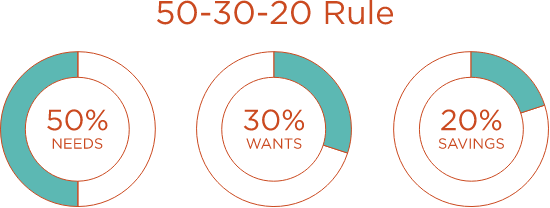
Published November 15, 2022
8 elements to track when building or reviewing your budget
If you’re like most people in this country, you don’t keep a budget. We get it. Spending money is easy. Tracking it—not so much. If ever there was a time to start budgeting, though, it’s now. Rising prices are shrinking buying power, making it critical to know how much you’re spending and on what. That way, you can make informed decisions to ensure you continue to cover your expenses and save for the future.
Even if you have budgeting down to a science and are a master at managing your finances, persistent inflation and risk of recession could be changing the equations, so it’s a good idea to review your budget once a month going forward. Consider using a budget analysis tool as you look at your:
Expenses
First, review your mandatory recurring bills (rent/mortgage, utilities, credit cards, student loans, car payment, etc.). Then, take a look at your variable expenses. These items are more fluid, like groceries, entertainment, and general shopping. Chances are, what you’re paying for food, housing, healthcare, and gas is different than a year ago.

Income
You probably know your salary or hourly wage, but when was the last time you looked at a paystub to see how much you actually bring home after taxes and deductions? It’s important you know your net pay when making a budget. Especially because as inflation increases your expenses, it decreases the value of your wages. To get an accurate picture, look at your paystubs and any other sources of income from the past few months and add them up. If you have a side hustle or earn commission or tips, make a conservative guess that errs on the low side.

Goals
Over the past few years, many of us have reevaluated our goals, so your budget priorities may have changed. They could be as broad as “I want to save more money each month” or as specific as “I want to save $3,000 this year so we can take that trip” or “I want to buy a house in five years.” Confirming or adjusting your goals will help guide decisions along the way.

Needs and wants
Take a look at your expenses and bucket them as needs and wants to help you make decisions about where to spend and where to hold back—and remember, saving is a need, especially for your golden years. Be sure to prioritize building an emergency fund and retirement nest egg. A retirement planning calculator can help you determine how much you need to save to retire the way you want.

Plan to reach your goal
Once you’ve updated the numbers and your goal, take that information and make a plan to get from where you are to where you want to go. There are several well-established budget plans, such as the 50-30-20 rule (50% of your money on needs, 30% on wants, and 20% on saving and/or paying off debt). Play with the numbers and determine what works best for you. Want to save more money faster? Swap the 30 and 20 roles.

Monitoring tools
There’s nothing wrong with using pen and paper or Excel spreadsheets to monitor your spending and savings, but online tools can make it easier to stay on track. Online calculators are especially helpful if you’re wondering if you can save money by consolidating debt, refinancing, or paying off a mortgage early. Or maybe you want to know how much you need to save to become a millionaire? Whether you use digital resources or old-school methods, it’s important to monitor your income and expenses and review your budget monthly.

Adaptability
With so much fluctuation in the economy right now, there’s a good chance your income or spending may change one way or the other. If it does, you need to assess whether your budget still makes sense and adapt if necessary. If you get a raise or bonus, maybe increase the amount you contribute to your retirement plan or emergency fund. If you’re hit with an unexpected expense like a major car repair, you might need to adjust your entertainment spending until you’re caught up.

Rewards
Celebrate the little milestones on the way to reaching your goal, like every time you pass a certain dollar amount in your savings account. Sticking to a budget isn’t easy, but rewarding yourself for your accomplishments will help you appreciate the sacrifice.

Explore our Financial Literacy Hub and our blog for content that helps you make money decisions confidently.

Life needs balance.
Take the stress out of banking with no monthly service fees and no minimum balance requirements. Open a Carefree Checking™ account today.


